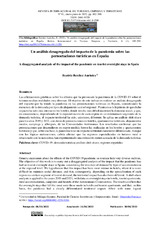Mostrar el registro sencillo del ítem
Un análisis desagregado del impacto de la pandemia sobre las pernoctaciones turísticas en España
| dc.contributor.author | Benítez Aurioles, Beatriz | |
| dc.date.accessioned | 2022-09-02T10:14:18Z | |
| dc.date.available | 2022-09-02T10:14:18Z | |
| dc.date.issued | 2022 | |
| dc.identifier.issn | 2530-7134 | |
| dc.identifier.uri | http://hdl.handle.net/10396/23812 | |
| dc.description.abstract | Las afirmaciones genéricas sobre los efectos que ha provocado la pandemia de la COVID-19 sobre el turismo ocultan realidades muy diversas. El objetivo de este trabajo es realizar un análisis desagregado del impacto que ha tenido la pandemia en las pernoctaciones turísticas en España, considerando la estructura de la demanda por tipos de alojamiento a nivel regional. Planteamos la hipótesis de que dicho impacto ha sido más intenso en los hoteles, donde resulta más difícil mantener la distancia social, y que, en consecuencia, dependiendo de la especialización de cada región en un determinado segmento de la demanda turística, el impacto territorial ha sido, asimismo, diferente. Se aplica un análisis shift-share para los años 2019 y 2021, con datos de pernoctaciones en hoteles, apartamentos turísticos, alojamientos rurales, campings y albergues, de las Comunidades Autónomas. Los resultados confirman que las pernoctaciones que descendieron en mayor medida fueron las realizadas en los hoteles y apartamentos turísticos y que, sobre esa base, la pandemia tuvo un impacto territorial claramente diferenciado. Aunque con las lógicas matizaciones, cabría afirmar que las regiones especializadas en turismo rural o relacionado con la naturaleza han experimentado una reducción menos acusada de la demanda turística. | es_ES |
| dc.description.abstract | Generic statements about the effects of the COVID-19 pandemic on tourism hide very diverse realities. The objective of this work is to carry out a disaggregated analysis of the impact that the pandemic has had on tourist overnight stays in Spain, considering the structure of demand by type of accommodation at the regional level. We hypothesize that this impact has been more intense in hotels, where it is more difficult to maintain social distance, and that, consequently, depending on the specialization of each region in a certain segment of tourist demand, the territorial impact has also been different. A shift-share analysis is applied to the years 2019 and 2021, with data on overnight stays in hotels, tourist apartments, rural accommodation, campsites and hostels of the Autonomous Communities. The results confirm that the overnight stays that fell the most were those made in hotels and tourist apartments; and that, on this basis, the pandemic had a clearly differentiated territorial impact. Albeit with some logical qualifications, it could be stated that the regions specialized in rural tourism or related to nature have experienced a less pronounced reduction in tourist demand. | es_ES |
| dc.format.mimetype | application/pdf | es_ES |
| dc.language.iso | spa | es_ES |
| dc.publisher | UCOPress | es_ES |
| dc.rights | https://creativecommons.org/licenses/by-nc/4.0/ | es_ES |
| dc.source | Revista Internacional de Turismo, Empresa y Territorio (RITUREM) 6(1), 182-200 (2022) | es_ES |
| dc.subject | COVID-19 | es_ES |
| dc.subject | Demanda turística | es_ES |
| dc.subject | Análisis shift-share | es_ES |
| dc.subject | Regiones españolas | es_ES |
| dc.subject | Tourist demand | es_ES |
| dc.subject | Shift-share analysis | es_ES |
| dc.subject | Spanish regions | es_ES |
| dc.title | Un análisis desagregado del impacto de la pandemia sobre las pernoctaciones turísticas en España | es_ES |
| dc.title.alternative | A disaggregated analysis of the impact of the pandemic on tourist overnight stays in Spain | es_ES |
| dc.type | info:eu-repo/semantics/article | es_ES |
| dc.relation.publisherversion | http://www.uco.es/ucopress/ojs/index.php/riturem/index | es_ES |
| dc.rights.accessRights | info:eu-repo/semantics/openAccess | es_ES |

